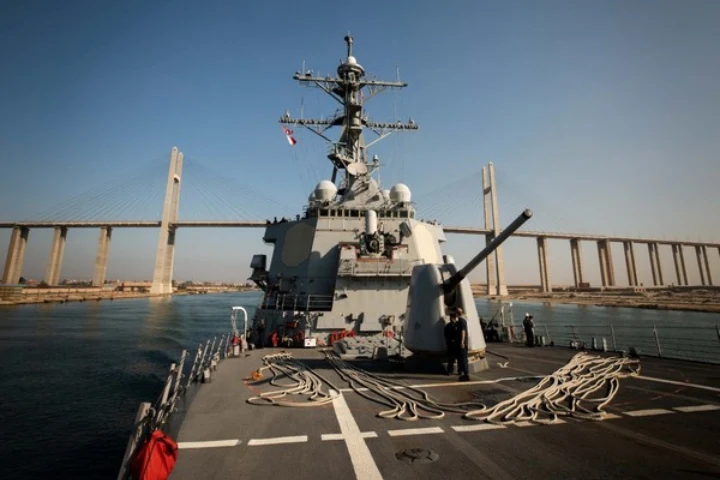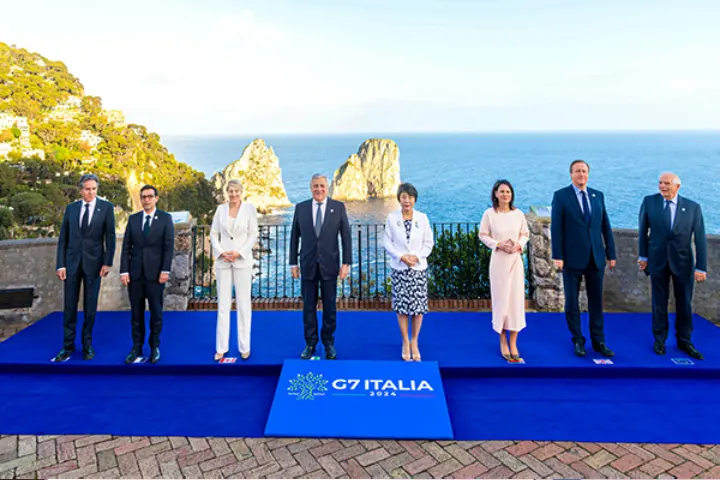The Philippines is set to hold a military exercise with US and Japanese forces from April 22 to May 10, after reaffirming its bilateral ties at an unprecedented trilateral summit held at the White House on April 12, Nikkei Asia reports. Is.
“The Armed Forces of the Philippines (AFP) and the US Army will conduct the 39th iteration of Balikatan, the largest annual bilateral training exercise between the two allies, from April 22 to May 10. This exercise directly supports US-Philippine mutual defense. The treaty enhances military cooperation and readiness between the two armies,” the US Embassy in the Philippines said in an official statement.
More than 16,000 members of the AFP and the US military will train together this year. For the first time in the history of the Australian Defense Force and Balikatan, French Navy contingents will also join the exercise as participants. Meanwhile, 14 countries will participate as part of the international observer program organized by AFP: Brunei, Canada, France, Germany, Great Britain, India, Indonesia, Japan, Malaysia, New Zealand, Republic of Korea, Singapore, Thailand and Vietnam. This was added.
Shortly after the trilateral summit at the White House, the Philippine Coast Guard welcomed the resulting “positive efforts” in maritime security with Japan and the US, something experts claimed Manila had done in relation to long-running tensions in the south. There is room for improvement in relations with Beijing. China Sea.
In its statement regarding the military exercise, the Philippines Coast Guard welcomed the development, saying, “The Philippine Coast Guard (PCG) particularly appreciates the recent announcement on the establishment of the trilateral during the trilateral summit between the Philippines, Japan and the US. Welcomed.” “Maritime dialogue to enhance coordination and collective responses to promote maritime cooperation,” Nikkei Asia reported, citing a PCG statement issued on Friday afternoon.
In a related matter, negotiations on a reciprocal access agreement between Manila and Tokyo are said to be in the final stages. Such an agreement would ease the movement of military forces between the countries, making it easier for the Armed Forces of the Philippines (AFP) and the Japan Self-Defense Forces to conduct joint exercises. Washington and Manila already have a similar setup called the Visiting Forces Agreement, Nikkei Asia reports.
“We consider the planned trilateral maritime exercise and capability a positive effort that will promote interoperability of maritime operations,” the PCG statement said.
Japan and the United States have cooperated in support of PCG capacity building, and the three countries held the first-ever trilateral coast guard exercise last June.
A joint statement issued after the Marcos-Kishida-Biden summit showed that security ties are strengthening. “The United States looks forward to welcoming Philippine and Japan Coast Guard members aboard a U.S. Coast Guard ship during patrols in the Indo-Pacific this year,” it said.
Many experts have praised the Philippines for strengthening its defense ties with Japan and the US, Nikkei Asia reports.
“Marcos' decision to attend today's trilateral summit with Biden and Kishida is increasing antagonism against China,” Derek Grossman, a senior defense analyst at the Rand Corp., a California-based think tank, told Nikkei Asia. “There is some risk, but there appear to be no other viable options if Beijing continues to claim most of Manila's EEZ.”
Yusuke Takagi, a Southeast Asia expert and associate professor at the National Graduate Institute for Policy Studies in Japan, agreed. “A big problem is that China's maritime expansion [into the South China Sea] Will it continue or stop,” he said. “Since there is no sign that China will stop…it would be a good strategy for the Philippines to engage as many partners as possible through multilateral cooperation.”
Chinese ships have repeatedly fired water cannon blasts at Philippine ships conducting supply missions in the South China Sea, Nikkei Asia reports. Since being elected in 2022, Marcos has reversed the pro-China policy stance of his predecessor Rodrigo Duterte and has begun to assert Manila's sovereignty over parts of the South China Sea.
China has been criticized by name in the summit statement. “We express our grave concerns about the dangerous and aggressive behavior of the People's Republic of China (PRC) in the South China Sea,” it said.
China, which claims almost the entire water reserves, responded immediately. Shortly after the trilateral meeting, Chinese Foreign Ministry spokesman Mao Ning said in a statement, “China firmly rejects anything that creates and escalates tensions and undermines other countries' strategic security and interests.” Can.”
The Philippines is not the only ASEAN country to claim sovereignty in the South China Sea that matches China's audacious claim. But another aspect of the Philippines' relationship with China sets it apart: it received no additional benefits from its warm ties with China during the Duterte era. It appears that this is the factor that has led Marcos to get closer to Japan and the United States.
Grossman said, “Once Marcos became president, he recognized that his predecessor's China policy had brought no tangible benefits to the Philippines and was deeply unpopular with the people.” For example, “China's Belt and Road Initiative resulted in virtually no new infrastructure and investment.”
Don McLane Gil, an analyst and lecturer at De La Salle University in Manila, had similar views. He considers the trilateral partnership “a significant breakthrough” for the Philippines, which could be “an important step” in enhancing its maritime security capabilities. But, he stressed, “it is also an opportunity to strengthen other forms of cooperation, particularly in economics and trade and industry.”
There is also consensus among pundits that Marcos' decision to move closer to Japan and the United States will not prevent the Philippines from improving its relations with Beijing.
Julio Amador, CEO of Amador Research Services in the Philippines, sees the trilateral summit as “one of the most important diplomatic victories” in recent years. But, he said, “pursuing further security ties with Japan and the United States should not mean that Manila should unnecessarily antagonize Beijing.
“The Philippines should work with China to reduce overall tensions in the region, but Beijing needs to be a credible and reliable actor. He has not shown that he is willing to do so. The ball is in Beijing’s court,” Amador told Nikkei Asia.
Wataru Kusaka, a professor at Tokyo University of Foreign Studies and an expert on Philippine studies, believes that political and geopolitical circumstances forced Marcos to step into the Japan-US camp. “As anti-China public opinion is rising in the Philippines, President Marcos wanted to warn against China. But one should not do too much,” he said.
The Philippines has long-standing relations with China, partly due to the countries' economic and geographical proximity.
He said Manila's next action towards China will be important in creating a balance between China and countries like the US. And Japan. “The US and Japan should not force the Philippines to go to one side or the other,” he said.
PressNews24 provides latest news, bollywood news, breaking news hollywood, top tech news, business standard news, indian economy news, world economy news, travel news, mumbai news, latest news mumbai loksabha election 2024, video viral news, delhi news, Only at PressNews24.in






